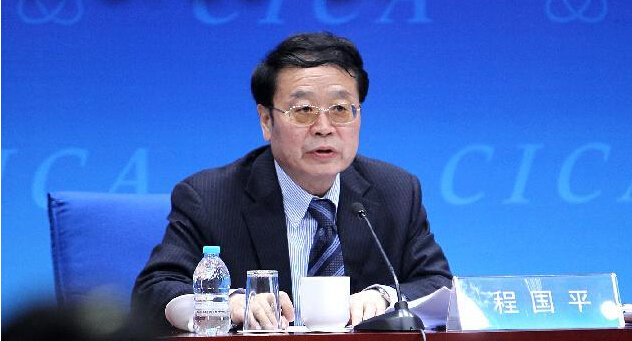Expert: Terrorism shifts from Middle East to other regions
- By Li Jingrong
 0 Comment(s)
0 Comment(s) Print
Print E-mail China.org.cn, March 13, 2017
E-mail China.org.cn, March 13, 2017
|
|
|
Cheng Guoping, as the vice foreign minister, answers questions from the press at the press briefing of the 4th Summit of the Conference on Interaction and Confidence Building Measures in Asia (CICA) in Shanghai, east China, May 18, 2014. [Photo/Xinhua] |
Extremist terrorist groups are shifting their main targets from the Middle East – where they have suffered heavy losses – to other parts of the world, said Cheng Guoping, state commissioner for counterterrorism and security matters.
Cheng, a member of the Chinese People's Political Consultative Conference (CPPCC) and former vice foreign minister, made the remarks in an exclusive interview with guanhaijieju – the WeChat account of Legal Evening News – on the sideline of the annual session of the CPPCC in Beijing.
"The anti-terrorism situation in the surrounding regions of China is controllable as a whole, but it tends to be severe and complicated," he said, adding "it has a direct relationship with the overall situation of international anti-terrorism efforts."
As progress has been seen in the anti-terrorist fight in Syria and Iraq, international terrorism is entering a new phase, in which extremist and terrorist groups are tweaking their strategies, Cheng warned.
"An increasing number of terrorists are penetrating and gathering momentum in Southeast Asia, Central Asia and South Asia, and the security situation in Afghanistan is particularly alarming," he said.
Cheng said that since the beginning of this year, the border areas of Afghanistan and Pakistan have been hit by frequent terrorist attacks targeting both civilians and officials, resulting in heavy casualties.
In addition to a series of terrorist attacks launched in European countries in recent years, the situation can be seen as an obvious strategic shift on the side of the terrorists, he said.
In regard to cracking down on terrorism within its borders, China has built anti-terrorist cooperation mechanisms with all of its 14 neighboring countries and major Western countries, including the United States, according to Cheng.
Cheng revealed that a Chinese delegation led by him paid a visit to Pakistan last month, during which leaders of the two sides exchanged views on strengthening security cooperation between the two countries, particularly in safeguarding the building of the China-Pakistan Economic Corridor, and reached a new consensus in this regard.
The anti-terrorist mechanisms that China has established with its neighbors have connected ministries in charge of foreign affairs and public security as well as defense authorities, Cheng said. He cited the example of the Shanghai Cooperation Organization (SCO), an intergovernmental international organization involving six countries – China, Russia, Kazakhstan, Kyrgyzstan, Tajikistan and Uzbekistan.
Speaking of anti-terrorist cooperation between China and Russia, Cheng believed that Russia has extensive experience from its long-term fight against terrorism, particularly in collecting intelligence.
"Russia has established a considerably complete system of intelligence collection and information-exchanging mechanism with some Arabian countries. I think China should have more cooperation with Russia in this regard," he said.
Cheng said that anti-terrorism is a serious task facing the governments of all countries, adding that the United Nations has also put anti-terrorism as one of its main priorities.
More about state commissioners
China has long attached great importance to international anti-terrorism cooperation, and the Chinese government decided to introduce the state commissioner posts as a key measure for improving the fight against terrorism and global cooperation, according to Cheng.
China has two state commissioners for counterterrorism and security matters – Cheng and Zhang Xinfeng, former vice minister of public security. Such state commissioners focus on anti-terrorism diplomacy and play a special role in strengthening coordination between domestic departments, particularly between the central government and local ones, Cheng said.






